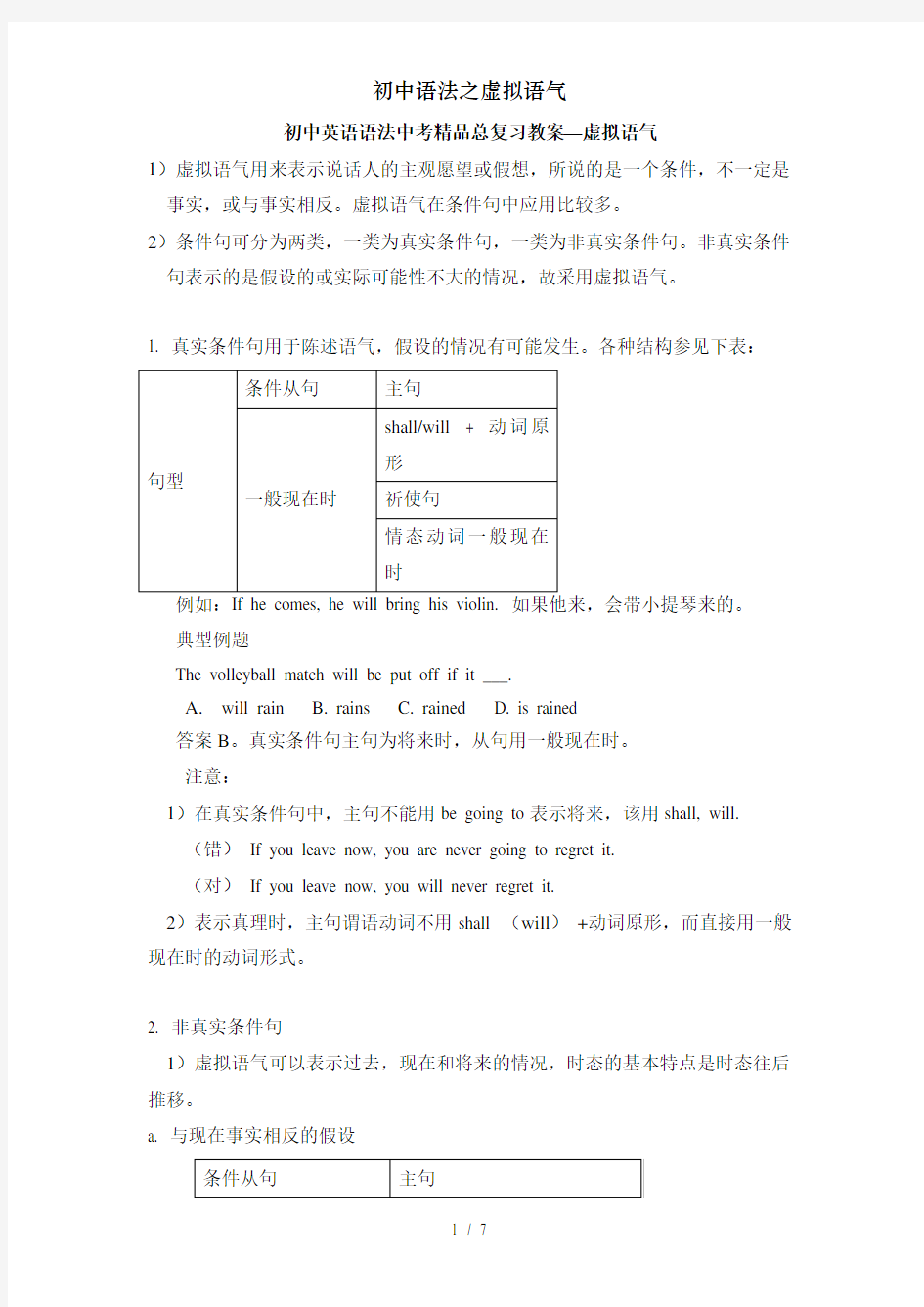初中语法之虚拟语气

- 1、下载文档前请自行甄别文档内容的完整性,平台不提供额外的编辑、内容补充、找答案等附加服务。
- 2、"仅部分预览"的文档,不可在线预览部分如存在完整性等问题,可反馈申请退款(可完整预览的文档不适用该条件!)。
- 3、如文档侵犯您的权益,请联系客服反馈,我们会尽快为您处理(人工客服工作时间:9:00-18:30)。
初中英语语法中考精品总复习教案—虚拟语气
1)虚拟语气用来表示说话人的主观愿望或假想,所说的是一个条件,不一定是事实,或与事实相反。虚拟语气在条件句中应用比较多。
2)条件句可分为两类,一类为真实条件句,一类为非真实条件句。非真实条件句表示的是假设的或实际可能性不大的情况,故采用虚拟语气。
1. 真实条件句用于陈述语气,假设的情况有可能发生。各种结构参见下表:
典型例题
The volleyball match will be put off if it ___.
A. will rain
B. rains
C. rained
D. is rained
答案B 。真实条件句主句为将来时,从句用一般现在时。
注意:
1)在真实条件句中,主句不能用be going to 表示将来,该用shall, will. (错) If you leave now, you are never going to regret it.
(对) If you leave now, you will never regret it.
2)表示真理时,主句谓语动词不用shall (will ) +动词原形,而直接用一般现在时的动词形式。
2. 非真实条件句
1)虚拟语气可以表示过去,现在和将来的情况,时态的基本特点是时态往后推移。
a. 与现在事实相反的假设
会帮助你的。
含义:They are not here, they can’t help you.
b. 与过去事实相反的假设
如果他昨天来的话,我会把这件事告诉他的。
含义:He did not come yesterday, so I did not tell him about it.
c. 表示对将来不大可能发生的事情的假想
一切都会好的。
If you should succeed, everything would be all right.
If you were to succeed, everything would be all right.
含义:You are not likely to succeed, everything will be what it is now.
3. 混合条件句
有时,主句与从句的动作发生在不同的时间,主句从句谓语动词的虚拟语气形式因时间不同而不同,这种条件句叫做混合条件句。例如:
If you had asked him yesterday, you would know what to do now. 如果你昨天问过他,今天就知道做什么了。
(从句与过去事实相反,主句与现在事实相反。)
If it had rained last night(过去), it would be very cold today (现在).如果昨晚下过雨,今天就会很冷了。
4. 虚拟条件句的倒装
虚拟条件句的从句部分含有were, should, 或had时, 可省略if,再把were, should或had 移到从句的句首,实行倒装。例如:
Were they here now, they could help us. =If they were here now, they could help us.他们现在在的话,就会帮助我们了。
Had you come earlier, you would have met him. =If you had come earlier, you would have met him.你来得早一点,就碰到他了。
Should it rain, the crops would be saved. =Were it to rain, the crops would be saved.假如下雨,庄稼就有救了。
注意:在虚拟语气的从句中,动词'be'的过去时态一律用"were",不用was,即在从句中be用were代替。例如:
If I were you, I would go to look for him. 如果我是你,就会去找他。
If he were here, everything would be all right. 如果他在这儿,一切都会好的。
典型例题
_____ to do the work, I should do it some other day.
A. If were I
B. I were
C. Were I
D. Was I
答案C. 在虚拟条件状语中如果有were, should, had这三个词,通常将if省略,主语提前, 变成were, should, had +主语的形式。但要注意,在虚拟条件状语从句中,省略连词的倒装形式的句首不能用动词的缩略形式。如我们可说Were I not to do, 而不能说Weren't I to do。
5. 特殊的虚拟语气词should
1)在主语从句中的应用
It is demanded / necessary / a pity + that…等结构的主语从句,谓语动词用should 加动词原形,should 可省略。
2)在宾语从句中的应用
在表示命令、建议、要求等一类动词后面的从句中,像order, suggest, propose, require, demand, request, insist, command, insist + (should)do等。例如:
I suggest that we (should)hold a meeting next week. 我建议下周召开个会议。
He insisted that he (should )be sent there.他要求被派到那儿去。
注意:如suggest, insist不表示"建议" 或"坚持要某人做某事时",即它们用于其本意"暗示、表明"、"坚持认为"时,宾语从句用陈述语气。
判断改错:(错)You pale face suggests that you(should)be ill.
(对)Your pale face suggests that you are ill.
(错)I insisted that you(should)be wrong.
(对)I insisted that you were wrong.
3)在表语从句,同位语从句中的应用
suggestion, proposal, idea, plan, order, advice等名词后面的表语从句、同位语从句中要用虚拟语气,即(should)+动词原形。例如:
My idea is that we(should)get more people to attend the conference.我的想法是让更多的人来参加会议。
I make a proposal that we(should)hold a meeting next week.我提了个建议,下周我们开个会。
6. wish的用法
1)wish后面的从句,表示与事实相反的情况,或表示将来不太可能实现的愿望。其宾语从句的动词形式为:
